
Electricity generation is the process of generating electric power from sources of primary energy. For utilities in the electric power industry, it is the stage prior to its delivery to end users or its storage.
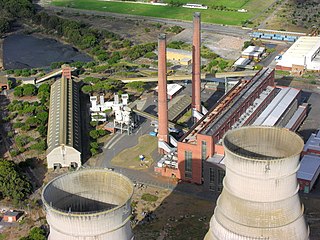
A power station, also referred to as a power plant and sometimes generating station or generating plant, is an industrial facility for the generation of electric power. Power stations are generally connected to an electrical grid.
Puget Sound Energy (PSE) is an energy utility company based in the U.S. state of Washington that provides electrical power and natural gas to the Puget Sound region. The utility serves electricity to more than 1.1 million customers in Island, King, Kitsap, Kittitas, Pierce, Skagit, Thurston, and Whatcom counties, and provides natural gas to 750,000 customers in King, Kittitas, Lewis, Pierce, Snohomish and Thurston counties. The company's electric and natural gas service area spans 6,000 square miles (16,000 km2).
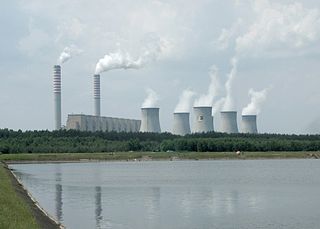
A fossil fuel power station is a thermal power station which burns a fossil fuel, such as coal or natural gas, to produce electricity. Fossil fuel power stations have machinery to convert the heat energy of combustion into mechanical energy, which then operates an electrical generator. The prime mover may be a steam turbine, a gas turbine or, in small plants, a reciprocating gas engine. All plants use the energy extracted from the expansion of a hot gas, either steam or combustion gases. Although different energy conversion methods exist, all thermal power station conversion methods have their efficiency limited by the Carnot efficiency and therefore produce waste heat.

Constellation Energy Corporation is an American energy company headquartered in Baltimore, Maryland. The company provides electric power, natural gas, and energy management services. It has approximately two million customers across the continental United States.
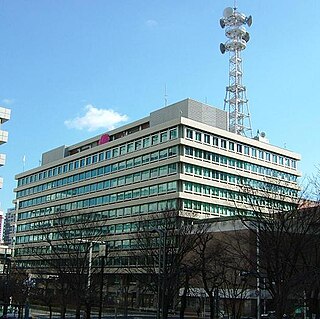
Chubu Electric Power Co., Inc., abbreviated as Chuden in Japanese, is a Japanese electric utilities provider for the middle Chūbu region of the Honshu island of Japan. It provides electricity at 60 Hz, though an area of Nagano Prefecture uses 50 Hz. Chubu Electric Power ranks third among Japan's largest electric utilities in terms of power generation capacity, electric energy sold, and annual revenue. It is also one of Nagoya's "four influential companies" along with Meitetsu, Matsuzakaya, and Toho Gas. Recently, the company has also expanded into the business of optical fibers. On January 1, 2006, a new company, Chubu Telecommunications, was formed.
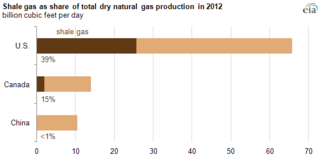
Shale gas is an unconventional natural gas that is found trapped within shale formations. Since the 1990s a combination of horizontal drilling and hydraulic fracturing has made large volumes of shale gas more economical to produce, and some analysts expect that shale gas will greatly expand worldwide energy supply.

Coal generated about 19.5% of the electricity at utility-scale facilities in the United States in 2022, down from 42% in 2014. In 2021, coal supplied 9.5 quadrillion British thermal units (2,800 TWh) of primary energy to electric power plants, which made up 90% of coal's contribution to U.S. energy supply. Utilities buy more than 90% of the coal consumed in the United States. There were over 200 coal powered units across the United States in 2022. Coal plants have been closing since the 2010s due to cheaper and cleaner natural gas and renewables. But environmentalists say that political action is needed to close them faster, to reduce greenhouse gas emissions by the United States to better limit climate change.

The Chalk Point Generating Station is an electricity-generating plant, comprising oil and natural gas fired units, owned by NRG Energy, located near the town of Eagle Harbor, Maryland, United States, on the Patuxent River.
According to the International Hydropower Association, Canada is the fourth largest producer of hydroelectricity in the world in 2021 after the United States, Brazil, and China. In 2014, Canada consumed the equivalent of 85.7 megatonnes worth of oil of hydroelectricity, 9.8% of worldwide hydroelectric consumption. Furthermore, hydroelectricity accounted for 25.7% of Canada's total energy consumption. It is the third-most consumed energy in Canada behind oil and natural gas.

Energy in Armenia is mostly from natural gas. Armenia has no proven reserves of oil or natural gas and currently imports most of its gas from Russia. The Iran-Armenia Natural Gas Pipeline has the capacity to equal imports from Russia.
Martin Next Generation Solar Energy Center is the solar parabolic-trough component of an integrated solar combined cycle (ISCC) 1150 MW plant, in western Martin County, Florida, United States, just north of Indiantown. The project was built by Florida Power & Light Company (FPL). Lauren Engineers & Constructors (Abilene, TX) was the EPC contractor for the project. Its construction began in 2008 and was completed by the end of 2010.

This article describes the energy and electricity production, consumption and import in Egypt.
Energy in Equatorial Guinea is an industry with plenty of potential, especially in the fields of oil and natural gas. However, production has been declining in recent years due to under-investment and lack of new discoveries. In 2022, the country produced less than 100,000 barrels of oil per day (bopd) according to OPEC data.
The Canal Generating Plant is a petroleum and natural gas electrical power station in Sandwich, Massachusetts. Canal 1, a baseload unit, began operation in 1968 and was for many years the most efficient oil burning plant in the US. Canal 2, a cycling unit began operation in the mid-1970s. The plant was bought by Mirant in 1999, now GenOn Energy Holdings division of NRG Energy. It is located on Cape Cod Canal. In its heyday, the Canal plant generated the vast majority of the Cape's power, but today functions only as a peaking plant.
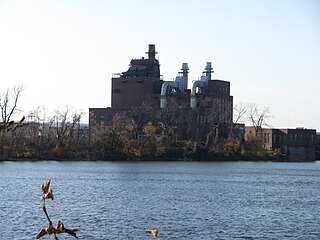
The West Springfield Generating Station, also known by its corporate name EP Energy Massachusetts, LLC, was a fossil-fuel-fired power plant located in West Springfield, Massachusetts. The station was a "peaking" facility, meaning that it primarily operates during peak electrical demand. The facility consisted of two 49-megawatt (MW) combustion turbine generators fueled by natural gas or ultra low-sulphur diesel fuel, one 18 MW jet turbine that was fueled by kerosene, and one 107 MW simple-cycle steam boiler unit burning no. 6 fuel oil, ULSD or natural gas. The station also had a small auxiliary boiler for process and building heat and an emergency back-up generator.

Energy in Jordan describes energy and electricity production, consumption and import in Jordan. Jordan is among the highest in the world in dependency on foreign energy sources, with 96% of the country's energy needs coming from imported oil and natural gas from neighboring Middle Eastern countries. This complete reliance on foreign oil imports consumes a significant amount of Jordan's GDP. This led the country to plan investments of $15 billion in renewable and nuclear energy. To further address these problems, the National Energy Strategy for 2007-2020 was created which projects to boost reliance on domestic energy sources from 4 per cent to 40 per cent by the end of the decade.
The pattern of energy production and use in Guam is shaped by its location, a remote island. Almost all energy is reliant on imports of petroleum products for use in transport and electricity. Guam has no domestic production of conventional fuels such as oil, natural gas or coal. Its economy is dependent on the import of gasoline and jet fuel for transport and residual fuel oil for electricity. One third of electricity produced is used in commercial settings including the leading industry of tourism. Despite making up about one-tenth of the islands population, the U.S. military uses one-fifth of the island's energy.
Whitegate power station is a 445 MW combined cycle gas turbine (CCGT) electricity generating station near Whitegate, County Cork in Ireland. It was commissioned in 2010 and can supply up to ten percent of the electricity demand in Ireland.













